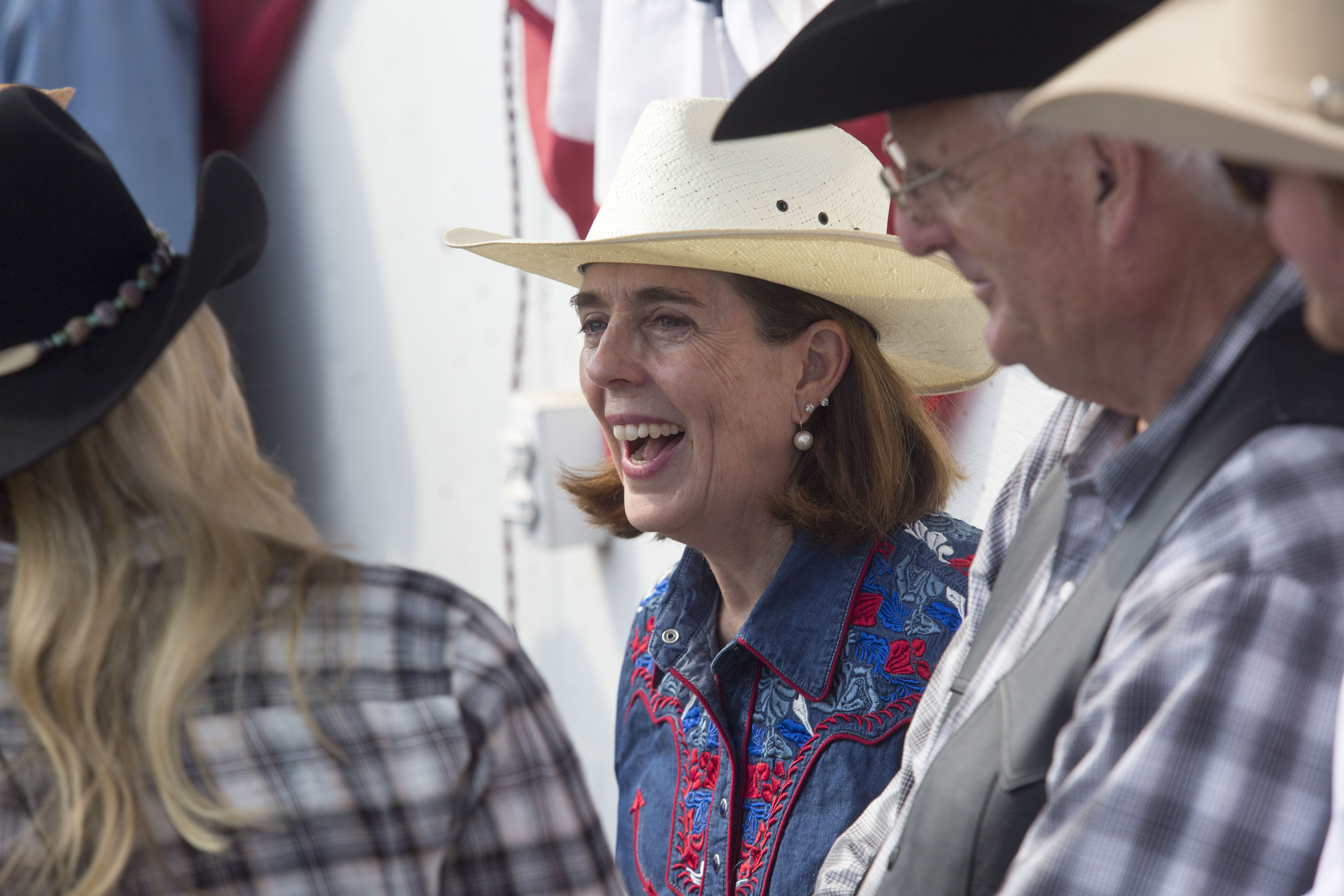There’s a longstanding notion that the mid-terms function as a referendum on a sitting president, a chance for voters to tacitly express their opinion on the policies and politics emanating from the White House. This fact did not work to Democrats’ advantage in 2014, as the party suffered sweeping losses in races across the country. Except, that is, in Oregon, where the Democrats gained a supermajority in the state senate and won 35 of 60 seats in the House.
Now the state’s heterodox status seems imminent once again: While the national Democratic establishment is hopeful that voters’ disillusionment with President Donald Trump will usher in a blue wave on par with 2014’s red one, expectations are significantly more tempered in Oregon. There, incumbent Governor Kate Brown, arguably the most progressive Democrat in office today, has been locked in a tight race for re-election against her Republican challenger, state representative Knute Buehler.
Brown took office in 2015 after her predecessor, John Kitzhaber, resigned in scandal, becoming the nation’s first openly LGBT governor. She won a special election in 2016, allowing her time to cement the state’s position as the most progressive state in the nation. Brown has signed legislation and issued executive orders streamlining automatic voter registration, preserving women’s access to abortions, expanding background checks for gun purchases, and strengthening transgender rights, sanctuary state laws, and environmental regulations.
But Brown’s progressive record does not guarantee a victory, even in a state that hasn’t elected a Republican governor in decades; her low-key leadership style doesn’t seem to resonate with Oregonians; focus groups suggest that voters aren’t all that familiar with her policy positions—despite an unprecedented legislative record. In October, the polling data aggregator Real Clear Politics called the race a “toss-up”; with just a week to go before the election, a poll showed that Brown held a narrow lead over Buehler of just 3 percentage points.
Buehler, an orthopedic surgeon, has campaigned as a moderate Republican, willing to break from his party on key issues—chiefly, reproductive rights and climate change (Buehler is pro-choice and believes climate change is man-made). On most other issues, Buehler toes the party line: He voted against legislation to expand background checks for gun purchases, opposes the state’s Clean Energy Fuels program, and has called for an end to Oregon’s status as a sanctuary state.
By September, the race had become the most expensive in state history, with Nike co-founder Phil Knight giving unprecedented amounts to the Republican hopeful. While Brown has raised more overall, Knight has donated $2.5 million to Buehler directly, and another $1 million to the Republican Governors Association, which has spent over $2 million in support of Buehler.
Pacific Standard spoke with Brown last week to get the governor’s take on the tight race, her unofficial title as the most progressive governor in the United States, and the surprising piece of advice she has for female politicians. (Hint: it sounds like it’s straight from the campaign playbook of Trump himself.)

Your most recent executive order was to ban offshore oil drilling, issued after the Trump administration failed to exempt Oregon from its plans to open up the U.S. coast to oil exploration. You said last month you were waiting for the federal government to come to its senses; what was the final straw?
I’ve had multiple conversations with Secretary [Ryan] Zinke, and the fact that we have heard nothing from the administration in response to our request made me want to move forward here as quickly as possible to essentially ban offshore drilling, not only in Oregon’s territorial seas but the continental shelf.
Do you think Oregon can or should be a leader on climate and other environmental issues, given the Trump administration’s stance on regulation?
We’re a really small state but I think we can still play a leadership role; that’s what we’re doing around the offshore drilling. For me, the IPCC report was a wake-up call. We can’t wait. If we’re not going to get help or support from the federal government we have to do this on our own. That’s why one of the other initiatives that we’re working on is essentially codifying the Clean Air Act and the Clean Water Act, both federal statutes, into state law. We’re working with a handful of other states to do the same thing in the next upcoming legislative session.
How do you convince conservative Oregonians that those environmental protections don’t have to come at the expense of the economy?
We have fought over the last 30 years in this state to preserve clean air and clean water and we’ve been able to create good paying jobs in communities around the state—and we will continue to do that.
I’ll share two great examples of work we’re doing in rural Oregon, which tends to be more conservative: my work to invest in cross-laminated timber, advance wood manufacturing, and grow jobs in timber-dependent rural communities, specifically Douglas County, and have products to build what are as sustainable and frankly more earthquake resilient than other buildings using cross-laminated timber, and then my work to invest in unmanned aerial vehicles. I would say the key place where this is happening is Pendleton, Oregon, also a rural community, and it’s an opportunity for some really good-paying jobs. So I believe we can do both. We continue to make progress on environmental policy and we have the lowest unemployment in Oregon history, and one of the fastest job growth rates, and some of the fastest growing jobs are in the renewable energy arena—wind, solar, geothermal.

(Photo: Brendan Smialowski/AFP/Getty Images)
Oregon has some of the most aggressive targets for renewable energy—half the state’s energy must come from renewables by 2040—how does that square with the proposed Jordan Cove Energy Project, which would bring a natural gas pipeline and export facility to the state?
I believe very strongly that my role as governor is to enforce Oregon law and make sure that Oregonians’ voices are heard in this process. This project should be treated no differently than any other project in Oregon. My opponent would essentially allow this project to butt in line—he would give this a short cut. I’m not willing to do that. There are roughly a dozen permitting processes and I want to make sure that Oregon regulations are complied with and Oregon law is enforced.
It must have been frustrating to hear a Trump adviser attempt to fast track the project’s approval last year then?
It’s extremely disconcerting when the federal government tries to override Oregon’s environmental land use and ocean use policy.
You’ve been called the most progressive governor in the country, the anti-Trump, not just for your environmental record but progressive legislation in other areas as well: protections for transgender rights, immigrants, abortions—
Voting access, you name it—
Exactly, so I’m wondering what you make of that title? Was a lot of that legislation in response to what you saw his administration doing?
A lot for me is tone. I’ve tried to be extremely respectful of the president. I just reached my limit when this administration started ripping children away from their families and literally putting these children in cages, and so anytime that this administration stomps on Oregonians or Oregon values I’m going to fight back. One of the issues that we’re fighting back against right now is the Trump administration’s efforts to repeal the requirements that there be coverage for pre-existing conditions.
How do you sell conservative Oregonians on some of your more progressive pieces of legislation, like the gun safety laws you have passed?
In terms of firearm safety, honestly I am not interested in taking anyone’s guns away. I am very committed to making sure that we have common-sense firearm safety. Ninety-five percent of Americans support a comprehensive background check. My opponent voted against it—he’s a doctor, and he voted against one of the best, evidence-based tools that we have to ensure firearm safety. We are still discussing the safety measures around storage, because of my specific concerns about rural Oregon.
You mean a law requiring gun owners to lock up their weapons or assume liability for injuries caused by their weapons?
Right. There have been proposals to require a lock up, and you could tax credit those—and the liability issue. But I have spent time in rural communities; I know when people go out hunting they don’t put their guns away, they just put them in the pantry, so we need practical solutions that make sense for both rural and urban Oregon.
How do you respond to critiques that you’re too focused on national issues, like climate change and abortion, at the expense of local ones?
Have the Trump administration’s policies added a whole new set of responsibilities to my job? Absolutely. But I have still continued to push Oregon forward on progressive policy that is groundbreaking for the nation. I will tell you five bills that are the first of their kind in the country: Automatic voter registration; the women’s reproductive health bill was the most comprehensive in the entire nation; on our minimum wage legislation, California and New York followed our lead; our “Coal to Clean” legislation, intentionally moving away from coal-generated electricity and doubling our renewable portfolio standards, was the first of its kind in the entire country; our work to create Oregon Saves, a retirement program for folks who don’t have an employer-provided savings plan is also the first in the country and a national model; and the legislation I signed into law creating the nation’s first fair-scheduling bill was a consensus approach between business and labor to ensure that employees working for large companies would get their schedule two weeks ahead of time, so that they could schedule daycare, doctor’s appointments.
We’ve got the lowest unemployment rate in Oregon history, with one of the fastest job growth rates in the country. I have stood up and spoken out against the Trump administration, crafted a handful of executive orders on immigration—saying we will not sign onto a Muslim registry and we will require Oregon’s sanctuary state to include all of our state employees, to doubling the number of electric vehicles. I think all of this is groundbreaking, and I don’t think it’s ignored Oregonians at all. My work has specifically been dedicated to supporting working families and struggling Oregonians, and I would argue that my opponent in his work in the legislature has ignored these families. He voted against the minimum wage; he voted against our transportation package, which provided public transit statewide; he voted against health-care funding; he voted against legislation to cover every single kid but for the fact that he’s made millions off the health-care industry.
You want me to keep going? It’s a little frustrating for me when I hear we are ignoring local issues. I don’t think that’s the case at all.
I think that’s plenty. Democrats often have a tough time getting their base to the polls in mid-term elections. Why do you think that is, and do you expect the automatic voter registration to make a difference?
I do think that it will make a difference in turnout. We know from the numbers. I crafted it as secretary of state. I actually got to sign my own bill into law after I became governor. Over a period of about a year and a half prior to the 2016 election cycle, they added roughly 240,000 Oregonians to the rolls. I know that, in 2016, about 40 percent of those folks voted, and I will tell you they tend to be less urban, younger, and less wealthy than the typical registered voter. I don’t know what the numbers look like since then—I haven’t tracked them as closely—but I do think its a good thing for democracy and I think that’s really important. We’re here to do the most good for the majority of the people, and streamlining and making it more convenient and cost efficient to register people to vote is just a common-sense tool. I’m just appalled honestly that people in this country are not saying we need to do this.

(Photo: Natalie Behring/Getty Images)
Oregon’s economy is strong, the Trump administration is pretty unpopular in the state, and yet favorability ratings have fallen for Democrats in Oregon, and you’re facing this tight race. Does that signal that maybe it’s time re-evaluate the Democratic package?
I think the reason why folks are frustrated with everyone right now is because there’s a lot of families out there that are still struggling, a lot of seniors worried about losing their homes, a lot of families doubled up living with their parents, living in cars. There’s a lot of housing insecurity. I would certainly argue that is due, in part, to what’s happening at the federal level, and the Trump administration pulling the rug out from underneath the states on housing. But it also is because people want to move here, and the competition is really high.
In terms of my opponent, his record is not moderate, and he’s been financed primarily by one extremely wealthy investor [Knight], who has provided close to a third of his resources. By one human being! You’ve got someone who is buying a megaphone so loud it drowns out all the other voices. And these races are always tight. In the 2014 campaign, Kitzhaber won with 49 percent of the vote. When Chris Dudley ran against Kitzhaber in 2010, it was a nail-biter. So this is not unusual.
You’re currently one of only six female governors, but there are more than double that number is races across the country right now—
I’m pretty damn excited.
Me too, honestly. It’s one facet of government that seems to have made the least progress in terms of gender equality.
It’s not too surprising, particularly after watching the 2016 campaign. Women have to be likable and they have to be competent, and men obviously don’t have to be either. Our current president has proven that. But women have really struggled to break into these executive posts. The dominant culture struggles to see women’s styles of leadership as leadership. I’m a consensus-oriented collaborator; I’m not a podium pounder. People struggle to see that as “leading.”
So what advice do you have for those women?
Fight like hell. My sense is that, generally speaking, a lot of women tend to not be self-promoters. I think women in these executive rolls need to start campaigning for the next election on day two basically.
This interview has been edited for length and clarity.




